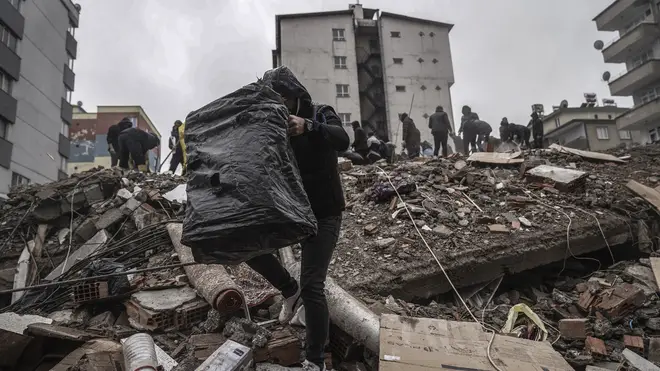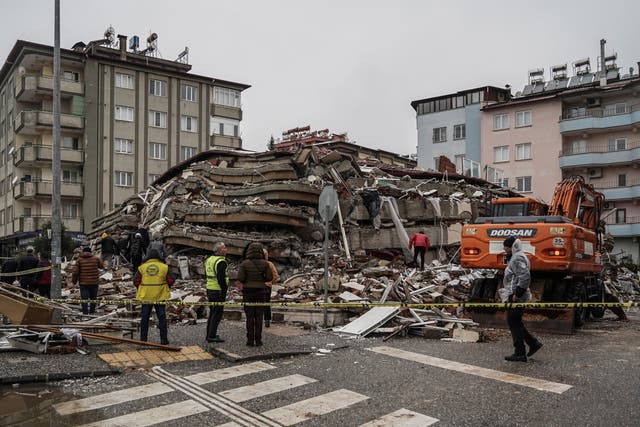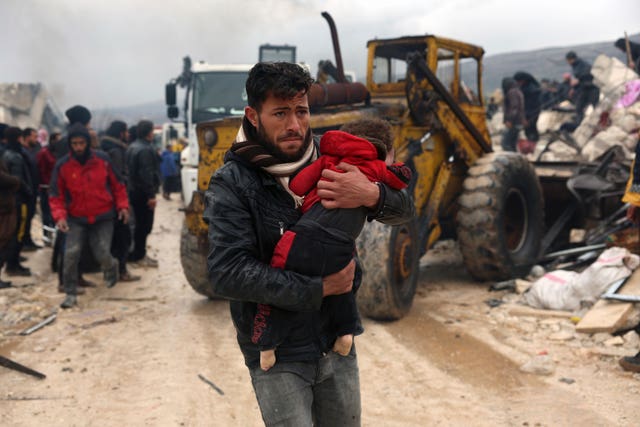
Henry Riley 4am - 7am
7 February 2023, 02:34

Seismic activity continued to rattle the region, including another jolt nearly as powerful as the initial quake.
The death toll surged past 4,000 as rescuers in Turkey and Syria worked overnight to find more survivors of the 7.8 magnitude earthquake that hit the region early on Monday.
Survivors cried out for help from within mountains of debris as first responders contended with rain and snow.
Seismic activity continued to rattle the region, including another jolt nearly as powerful as the initial quake, with workers carefully pulling away slabs of concrete and reaching for bodies as desperate families waited for news of loved ones.
“My grandson is 1 1/2 years old. Please help them, please… They were on the 12th floor,” Imran Bahur wept by her destroyed apartment building in the Turkish city of Adana on Monday.
Tens of thousands who were left homeless in Turkey and Syria faced a night in the cold.
In the Turkish city of Gaziantep, a provincial capital about 20 miles from the epicentre, people took refuge in shopping malls, stadiums, mosques and community centers. Turkish President Recep Tayyip Erdogan declared seven days of national mourning.
US President Joe Biden called Mr Erdogan to express condolences and offer assistance to the Nato ally, with the White House adding it was sending search-and-rescue teams to support Turkey’s efforts.

The quake, which was centered in Turkey’s south-eastern province of Kahramanmaras, sent residents of Damascus and Beirut rushing into the street and was felt as far away as Cairo.
It piled more misery on a region that has seen tremendous suffering over the past decade.
On the Syrian side, the area is divided between government-controlled territory and the country’s last opposition-held enclave, which is surrounded by Russian-backed government forces. Turkey, meanwhile, is home to millions of refugees from the civil war.
In the rebel-held enclave, hundreds of families remained trapped in rubble, the opposition emergency organisation known as the White Helmets said in a statement.

The area is packed with some 4 million people displaced from other parts of the country by the war. Many live in buildings that are already wrecked from military bombardments.
Strained medical centers quickly filled with injured people, rescue workers said. Some facilities had to be emptied, including a maternity hospital, according to the SAMS medical organization.
More than 7,800 people were rescued across 10 provinces, according to Orhan Tatar, an official with Turkey’s disaster management authority.
The region sits on top of major fault lines and is frequently shaken by earthquakes. Some 18,000 were killed in similarly powerful earthquakes that hit north-west Turkey in 1999.
UPDATED: More information on the M7.8 #earthquake that occurred overnight in Turkey can be found here: https://t.co/IZ83eOTExL
Our thoughts go out to those affected. pic.twitter.com/2hWnbGlPZe
— USGS (@USGS) February 6, 2023
The US Geological Survey measured Monday’s quake at 7.8, with a depth of 11 miles. Hours later, a 7.5 magnitude temblor, likely triggered by the first, struck more than 60 miles away.
The second jolt caused a multi-storey apartment building in the Turkish city of Sanliurfa to topple onto the street in a cloud of dust as bystanders screamed, according to video of the scene.
Thousands of buildings were reported collapsed in a wide area extending from Syria’s cities of Aleppo and Hama to Turkey’s Diyarbakir, more than 200 miles to the north-east.
In Turkey alone, more than 5,600 buildings were destroyed, authorities said. Hospitals were damaged, and one collapsed in the city of Iskenderun.
Bitterly cold temperatures could reduce the time frame that rescuers have to save trapped survivors, said Steven Godby, an expert in natural hazards at Nottingham Trent University.
The difficulty of working in areas beset by civil war would further complicate rescue efforts, he added.
Offers of help — from search-and-rescue teams to medical supplies and money — poured in from dozens of countries, as well as the European Union and Nato.
The vast majority were for Turkey, with a Russian and even an Israeli promise of help to the Syrian government, but it was not clear if any would go to the devastated rebel-held pocket in the northwest.
The opposition’s Syrian Civil Defence described the situation in the enclave as “disastrous.”
The opposition-held area, centered on the province of Idlib, has been under siege for years, with frequent Russian and government airstrikes.
The territory depends on a flow of aid from Turkey for everything from food to medical supplies.